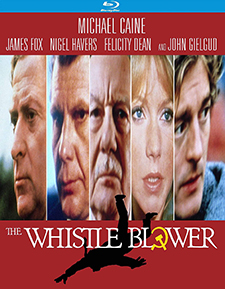Whistle Blower, The (Blu-ray Review)

Director
Simon LangtonRelease Date(s)
1986 (October 27, 2020)Studio(s)
Portreeve/UK Productions Entity/Hemdale (Kino Lorber Studio Classics)- Film/Program Grade: C+
- Video Grade: A-
- Audio Grade: C
- Extras Grade: D
Review
The Whistle Blower is an espionage drama heightened by the relationship between a father and son. It focuses on the extremes to which a secretive world will go to protect itself.
In the wake of the discovery that an employee of GCHQ, the British version of the CIA, is a double agent, an atmosphere of paranoia and extreme vigilance pervades the organization. Bob (Nigel Havers), a young linguist specializing in Russian translation, questions the morality of the new mandate that employees watch and report on each other. Bob enjoys his work but has become disillusioned with the agency and wants to leave the world of government-sanctioned snooping. He feels GCHQ has become too much like the KGB.
Bob’s father, Frank Jones (Michael Caine), a Korean War veteran who sacrificed a promising career in the military, is the widowed proprietor of a London typewriter and word processor store. A patriot at heart, Frank advises Bob to stick with the job, since his work is vital to British security. Frank subsequently is informed that Bob has died in a fall from a roof and his death has been deemed either an accident or suicide. Suspicious, Frank begins his own investigation to uncover the truth.
Directed by Simon Langton, The Whistle Blower is based on a novel by John Hale. Its lengthy opening sequence is an official ceremony in London honoring those who died for their country. A parade with regiments and a band in dress uniforms assemble at the Tomb of the Fallen. Then gradually, we’re introduced to the characters. Initially, we see family and friends interacting with no indication of conflict. When Bob and Frank take a long walk, Bob expresses his concerns and we learn that he’s one of the anonymous people who contribute to keeping the nation safe. Eventually, other characters come into play and that’s when things get murky.
James Fox and Gordon Jackson portray higher-ups in the British government and Barry Foster plays Frank’s wartime buddy. Are these the good guys? Or are they double agents? The confusion may be intentional, but it’s often hard to follow plot developments. The script is overly reliant on dialogue, and even though director Langton stages scenes in assorted locations, the ponderous verbiage becomes tedious. What the film could use is action. Though this is not intended as a James Bond-style thriller, a bit of derring-do would have helped to sustain viewer interest. There are, however, some surprises.
Rather than building to a dramatic climax, the film just peters out, ending with the same public ceremony, seen a year later in the opening. The idea was to emphasize that many lives have been lost fighting in wars but many others sacrificed their lives unheralded.
Caine conveys a quiet dignity as Frank. When his son is killed, he associates it with Bob’s dissatisfaction with work and desire to leave the agency. Conducting an unofficial investigation with the incisiveness of Sherlock Holmes, he employs methods ranging from asking officials basic questions to getting an old friend drunk and confronting a high-ranking British intelligence officer (John Gielgud, in a single scene cameo) in his own home. Caine plays Frank in an understated manner. Occasionally we see him tear up when he thinks of his deceased son, but he never loses his temper. His calm, measured approach gets results.
Evers plays Bob as pleasant and bookish. Bob has become involved with a married woman and her child. He does his translations for GCHQ routinely, regarding them as all in a day’s work, somewhat naive about the ramifications of his work. Recent rule changes have made him uncomfortable. He wants out.
The Blu-ray release of the film from Kino Lorber Studio Classics, featuring 1080p resolution, is presented in the widescreen aspect ratio of 1.85:1. This new 2K restoration looks very good throughout. Stock footage of the celebration at the Tomb of the Fallen is intercut with footage of Michael Caine among the crowd. Though a bit soft in comparison to the newer footage, the blend successfully creates the illusion that they comprise the same scene. Efforts are made to provide interesting visuals for the lengthy dialogue scenes. Bob and Frank walk through London streets and into a park. Colorful stained glass windows are seen in the background in another scene. An early scene is filmed on the roof of a building where Frank, Bob, and others chat. The surrounding buildings of the residential neighborhood are seen in the background. Interiors are brightly lit, with not much attempt at atmospheric lighting.
The sound quality on the English Mono DTS-High Definition Master Audio soundtrack is crisp, though the volume had to be greatly increased for the dialogue to be audible (which has been a problem in previous releases from Kino Lorber). Once the volume is increased, the dialogue can be heard but music and sound effects become overpowering. When Bob and Frank walk in London, the volume of traffic noises often makes the dialogue sound garbled. Dialogue is difficult to follow partly because of the British regional dialects and partly because many actors speak with little cadence and shading, making it hard to discern key points. Caine and Gielgud are exceptions. Every word is delivered with precision. The ceremony that opens the film features a loud marching band. Seen at the end of the film, a following year’s ceremony shows everyone, including Frank, in silence to honor the war dead. Optional subtitles in English SDH are available.
The only bonus features on this Region A Blu-ray release are several theatrical trailers: The Whistle Blower, The Ipcress File, Billion Dollar Brain, The Black Windmill, The Destructors, The Wilby Conspiracy, Blame It on Rio, The Holcroft Covenant, and Mr. Destiny.
– Dennis Seuling

